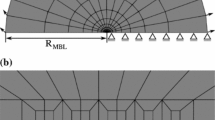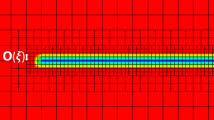Abstract
The size and viscosity effects are noticeable at the micro-/nano scale. In the present work, the strain gradient viscoelastic solution of the mode-III crack in an infinite quasi-brittle advanced material is proposed based on the strain gradient viscoelasticity theory using the Wiener–Hopf method. The solutions to the gradient-dependent viscoelastic crack problem are obtained directly by using the correspondence principle between the strain gradient viscoelasticity and strain gradient elasticity in Maxwell’s standard linear solid model. In this model, the stress near the crack tip is time-dependent and size-dependent. Besides, the stress near the crack tip is more significant than that based on gradient elasticity theory. Compared with the elastic strain gradient effect, the viscous gradient effect makes the stress field at the crack tip harden. The location and the value of maximum stress change with time, which differs from the case in strain gradient elasticity theory. The time that the normalized stress takes to stabilize also changes with the distance from the crack tip. When the viscosity effect is neglected or time tends to infinity, the strain gradient viscoelasticity theory can be reduced to the classical strain gradient elasticity theory.





Similar content being viewed by others
References
Aifantis EC (1992) On the role of gradients in the localization of deformation and fracture. Int J Solids Struct 30(10):1279–1299. https://doi.org/10.1016/0020-7225(92)90141-3
Akgöz B, Civalek Ö (2011) Strain gradient elasticity and modified couple stress models for buckling analysis of axially loaded micro-scaled beams. Int J Eng Sci 49(11):1268–1280. https://doi.org/10.1016/j.ijengsci.2010.12.009
Al-Basyouni KS, Tounsi A, Mahmoud SR (2015) Size dependent bending and vibration analysis of functionally graded micro beams based on modified couple stress theory and neutral surface position. Compos Struct 125:621–630. https://doi.org/10.1016/j.compstruct.2014.12.070
Altan BS, Aifantis EC (1997) On some aspects in the special theory of gradient elasticity. J Mech Behav Mater 8(3):30. https://doi.org/10.1515/JMBM.1997.8.3.231
Askes H, Sluys LJ (2003) A classification of higher-order strain-gradient models in damage mechanics. Arch Appl Mech 73(5–6):448–465. https://doi.org/10.1007/s00419-003-0296-3
Chen JY, Huang YY, Hwang KC (1997) Mode I and mode II plane-stress near-tip fields for cracks in materials with strain-gradient effects. KEM 145–149:19–28. https://doi.org/10.4028/www.scientific.net/KEM.145-149.19
Christensen RM (1982) Theory of viscoelasticity, 2nd edn. Dover Publications, Mineola
Christensen RM (2012) Theory of viscoelasticity: an introduction
Donà M, Palmeri A, Lombardo M (2014) Exact closed-form solutions for the static analysis of multi-cracked gradient-elastic beams in bending. Int J Solids Struct 51(15–16):2744–2753. https://doi.org/10.1016/j.ijsolstr.2014.02.020
Fu XL, Wang GF, Feng XQ (2008) Surface effects on the near-tip stress fields of a mode-II crack. Int J Fract 151(2):95–106. https://doi.org/10.1007/s10704-008-9245-z
Gao XL, Park SK (2007) Variational formulation of a simplified strain gradient elasticity theory and its application to a pressurized thick-walled cylinder problem. Int J Solids Struct 44(22–23):7486–7499. https://doi.org/10.1016/j.ijsolstr.2007.04.022
Georgiadis HG (2003) The mode III crack problem in microstructured solids governed by dipolar gradient elasticity: static and dynamic analysis. J Appl Mech 70(4):517–530. https://doi.org/10.1115/1.1574061
Graham GAC (1968) The correspondence principle of linear viscoelasticity theory for mixed boundary value problems involving time-dependent boundary regions. Q Appl Math 26(2):167–174. https://doi.org/10.1090/qam/99860
Hadjesfandiari AR, Dargush GF (2011) Couple stress theory for solids. Int J Solids Struct 48(18):2496–2510. https://doi.org/10.1016/j.ijsolstr.2011.05.002
Huang Y, Xue Z, Gao H, Nix WD, Xia ZC (2000) A study of microindentation hardness tests by mechanism-based strain gradient plasticity. J Mater Res 15(8):1786–1796. https://doi.org/10.1557/JMR.2000.0258
Joseph RP, Wang BL, Samali B (2018) Strain gradient fracture in an anti-plane cracked material layer. Int J Solids Struct 146:214–223. https://doi.org/10.1016/j.ijsolstr.2018.04.002
Kaminsky AA, Selivanov MF, Chernoivan YA (2014) Initial fracture of a viscoelastic isotropic plate with two collinear cracks of equal length. Int Appl Mech 50(3):310–320. https://doi.org/10.1007/s10778-014-0634-x
Lam DCC, Yang F, Chong ACM, Wang J, Tong P (2003) Experiments and theory in strain gradient elasticity. J Mech Phys Solids 51(8):1477–1508. https://doi.org/10.1016/S0022-5096(03)00053-X
Lazopoulos KA, Lazopoulos AK (2010) Bending and buckling of thin strain gradient elastic beams. Eur J Mech A Solids 29(5):837–843. https://doi.org/10.1016/j.euromechsol.2010.04.001
Li J, Wang B (2018) Strain gradient fracture of a mode III crack in an elastic layer on a substrate. J Mech Mater Struct 13(4):555–570. https://doi.org/10.2140/jomms.2018.13.555
Li XY, Wei YJ, Lu L, Lu K, Gao H (2010) Dislocation nucleation governed softening and maximum strength in nano-twinned metals. Nature 464(7290):877–880. https://doi.org/10.1038/nature08929
Lim CW, Zhang G, Reddy JN (2015) A higher-order nonlocal elasticity and strain gradient theory and its applications in wave propagation. J Mech Phys Solids 78:298–313. https://doi.org/10.1016/j.jmps.2015.02.001
Lin Z, Wei Y (2020) A strain gradient linear viscoelasticity theory. Int J Solids Struct 203:197–209. https://doi.org/10.1016/j.ijsolstr.2020.08.008
Lin Z, Yu Z, Wei Y (2020) Measurement of nanoindentation properties of polymers considering adhesion effects between AFM sharp indenter and material. J Adhes Sci Technol 34(15):1591–1608. https://doi.org/10.1080/01694243.2020.1714117
Lurie S, Solyaev Y (2018) Revisiting bending theories of elastic gradient beams. Int J Eng Sci 126:1–21. https://doi.org/10.1016/j.ijengsci.2018.01.002
Lurie SA, Volkov-Bogorodsky DB, Vasiliev VV (2019) A new approach to non-singular plane cracks theory in gradient elasticity. Math Comput App 24(4):93. https://doi.org/10.3390/mca24040093
Mindlin RD (1963) Influence of couple-stresses on stress concentrations. Exp Mech 3:1–7. https://doi.org/10.1007/BF02327219
Mindlin RD (1964) Micro-structure in linear elasticity. Arch Ration Mech Anal 16(1):51–78. https://doi.org/10.1007/BF00248490
Mindlin RD, Eshel NN (1968) On first strain-gradient theories in linear elasticity. Int J Solids Struct 4(1):109–124. https://doi.org/10.1016/0020-7683(68)90036-X
Mindlin RD, Tiersten HF (1962) Effects of couple-stresses in linear elasticity. Arch Ration Mech Anal 11(1):415–448. https://doi.org/10.1007/BF00253946
Moës N, Belytschko T (2002) Extended finite element method for cohesive crack growth. Eng Fract Mech 69(7):813–833. https://doi.org/10.1016/S0013-7944(01)00128-X
Mousavi SM, Paavola J, Baroudi D (2014) Cracks in strain gradient elasticity-distributed dislocation technique. 20th Eur Conf Fracture 3:77–82. https://doi.org/10.1016/j.mspro.2014.06.016
Mousavi SM, Paavola J, Baroudi D (2014b) Distributed non-singular dislocation technique for cracks in strain gradient elasticity. J Mech Behav Mater 23(3–4):47–58. https://doi.org/10.1515/jmbm-2014-0007
Nguyen ST (2014) Generalized Kelvin model for micro-cracked viscoelastic materials. Eng Fract Mech 127:226–234. https://doi.org/10.1016/j.engfracmech.2014.06.010
Papargyri-Beskou S, Tsepoura KG, Polyzos D, Beskos DE (2003) Bending and stability analysis of gradient elastic beams. Int J Solids Struct 40(1):385–400. https://doi.org/10.1016/S0020-7683(02)00522-X
Persson BNJ, Brener EA (2005) Crack propagation in viscoelastic solids. Phys Rev E 71(3):36123. https://doi.org/10.1103/PhysRevE.71.036123
Radi E, Gei M (2004) Mode III crack growth in linear hardening materials with strain gradient effects. Int J Fract 130(4):765–785. https://doi.org/10.1007/s10704-004-2549-8
Reddy JN (2007) Nonlocal theories for bending, buckling and vibration of beams. Int J Eng Sci 45(2–8):288–307. https://doi.org/10.1016/j.ijengsci.2007.04.004
Schapery RA (1984) Correspondence principles and a generalized J integral for large deformation and fracture analysis of viscoelastic media. Int J Fract 25:195–223. https://doi.org/10.1007/BF01140837
Sciarra G, Vidoli S (2013) Asymptotic fracture modes in strain-gradient elasticity: size effects and characteristic lengths for isotropic materials. J Elast 113(1):27–53. https://doi.org/10.1007/s10659-012-9409-y
Şimşek M, Reddy JN (2013) Bending and vibration of functionally graded microbeams using a new higher order beam theory and the modified couple stress theory. Int J Eng Sci 64:37–53. https://doi.org/10.1016/j.ijengsci.2012.12.002
Toupin RA (1962) Elastic materials with couple-stresses. Ration Mech Anal 11(1):385–414
Vardoulakis I, Exadaktylos G, Aifantis EC (1996) Gradient elasticity with surface energy: mode-III crack problem. Int J Solids Struct 33(30):4531–4559. https://doi.org/10.1016/0020-7683(95)00277-4
Wang G-F, Feng X-Q, Wang T-J, Gao W (2008) Surface effects on the near-tip stresses for mode-I and mode-III cracks. J Appl Mech 75(1):307. https://doi.org/10.1115/1.2712233
Wang Z-H, Zhang L, Guo L-C (2014) A viscoelastic fracture mechanics model for a functionally graded materials strip with general mechanical properties. Eur J Mech A Solids 44:75–81. https://doi.org/10.1016/j.euromechsol.2013.10.008
Wei YG (2006) A new finite element method for strain gradient theories and applications to fracture analyses. Eur J Mech A Solids 25(6):897–913. https://doi.org/10.1016/j.euromechsol.2006.03.001
Wei YG, Hutchinson JW (2003) Hardness trends in micron scale indentation. J Mech Phys Solids 51(11–12):2037–2056. https://doi.org/10.1016/j.jmps.2003.09.011
Yamada H, Ogasawara N, Shimizu Y, Horikawa K, Kobayashi H, Chen X (2013) Effect of high strain rate on indentation in pure aluminum. J Eng Mater Technol Trans ASME. https://doi.org/10.1115/1.4023778
Yang F, Chong ACM, Lam DCC, Tong P (2002) Couple stress based strain gradient theory for elasticity. Int J Solids Struct 39(10):2731–2743. https://doi.org/10.1016/S0020-7683(02)00152-X
Yao W, Li X, Hu X (2018) Viscoelastic crack analysis using symplectic analytical singular element combining with precise time-domain algorithm. Int J FractMech 214(1):29–48. https://doi.org/10.1007/s10704-018-0316-5
Zhao M, Slaughter WS, Li M, Mao SX (2003) Material-length-scale-controlled nanoindentation size effects due to strain-gradient plasticity. Acta Mater 51(15):4461–4469. https://doi.org/10.1016/s1359-6454(03)00281-7
Acknowledgements
We the undersigned declare that this manuscript is original, has not been published before and is not currently being considered for publication elsewhere. We confirm that the manuscript has been read and approved by all named authors and that there are no other persons who satisfied the criteria for authorship but are not listed. We further confirm that the order of authors listed in the manuscript has been approved by all of us. We understand that the Corresponding Author is the sole contact for the Editorial process. He/she is responsible for communicating with the other authors about progress, submissions of revisions and final approval of proofs.
Funding
This work was supported by the National Natural Science Foundation of China with grant nos. 11890681, 12032001, 11521202, and 11672301.
Author information
Authors and Affiliations
Contributions
K.D., Z.L. and Y.W. conceived and designed the project. K.D. and Y.W drafted the article and revised it critically. All authors reviewed the manuscript.
Corresponding author
Ethics declarations
Competing interests
The authors declare no competing interests.
Competing interest
The authors declare that they have no known competing financial interests or personal relationships that could have appeared to influence the work reported in this paper.
Additional information
Publisher's Note
Springer Nature remains neutral with regard to jurisdictional claims in published maps and institutional affiliations.
Rights and permissions
Springer Nature or its licensor (e.g. a society or other partner) holds exclusive rights to this article under a publishing agreement with the author(s) or other rightsholder(s); author self-archiving of the accepted manuscript version of this article is solely governed by the terms of such publishing agreement and applicable law.
About this article
Cite this article
Ding, K., Lin, Z. & Wei, Y. The strain gradient viscoelasticity full field solution of mode-III crack problem. Int J Fract 242, 71–83 (2023). https://doi.org/10.1007/s10704-023-00702-1
Received:
Accepted:
Published:
Issue Date:
DOI: https://doi.org/10.1007/s10704-023-00702-1




